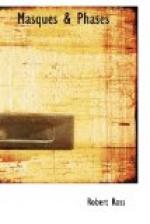L. C. I can hardly understand you. Painting, I admit, is entirely a lost art, so far as England is concerned. The death of Burne-Jones brought our tradition to an end. I see no future for any of the arts except needlework, of which, I am told, there is a hopeful revival. But in your fields of literature, what a number of great names! How I envy you!
L. T. Who is there?
L. C. Well, to take the novelists first: you have the great Thomas Hardy, H. G. Wells, Henry James, Rudyard Kipling, Maurice Hewlett . . . I can’t remember the names of any others just at present. Then take the poets: Austin Dobson, my own special favourite; and among the younger men, A. E. Housman, Laurence Housman, Yeats, Arthur Symons, Laurence Binyon, William Watson—
L. T. (interrupting). Who always keeps one foot in Wordsworth’s grave. But all the men you mention, my dear Cullus, belong to the last century. They have done their best work. Hardy has become mummy, and Henry James is sold in Balham. Except Hardy, they have become unintelligible. The theory that ‘to be intelligible is to be found out’ seems to have frightened them. The books they issue are a series of ‘not-at-home’ cards—sort of P.P.C.’s on posterity. And the younger poets, too, belong to the last century, or they stand in the same relation to their immediate predecessors, to borrow one of your metaphors, as l’art nouveau does to Chippendale. Oh, for the days of Byron, Keats, and Shelley!
L. C. All of whom died before they were matured. You seem to resent development. In literature I am a mere dilettante. A fastidious reader, but not an expert. I know what I don’t like; but I never know what I shall like. At least twice a year I come across a book which gives me much pleasure. As it comes from the lending library it is never quite new. That is an added charm. If it happens to have made a sensation, the sensation is all over by the time it reaches me. The book has matured. A quite new book is always a little crude. It suggests an evening paper. There at least you will agree. But to come across a work which Henry James published, say, last year, is, I assure you, like finding a Hubert Van Eyck in the Brompton Road.
L. T. I wish I could share your enthusiasm, or that I could change places with you. Every year the personality of a new artist is revealed to you. I know you only pretend not to admire the modern school of painting. You find it a convenient pose. Your flora and your fauna are always receiving additions; while my garden is withered; my zoo is out of repair. The bars are broken; the tanks have run dry. There is hardly a trace of life except in the snake-house, and, as I mentioned, the last giraffe is dead.
L. C. Our friend, Dr. Chalmers Mitchell, is fortunately able to give us a different account of the institution in Regent’s Park. You are quite wrong about modern painting. None of the younger men can paint at all. A few of them can draw, I admit. It is all they can do. The death of Charles Furse blasted all my hopes of English art. Whistler is dead; Sargent is an American.




